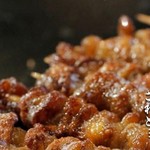
博多かわ屋 京橋南口店
Hakatakawaya
3.05
Kyobashi, OBP, Morinomiya
「Izakaya (Tavern)」
3,000-3,999円
--
Opening hours: [Moon - Earth] 17:00~23:00(LO22:30) 【Sun-Tuesday】17:00~22:30(LO22:00) Sunrise Branches
Rest time: 12/31 - 1/3
大阪府大阪市城東区新喜多1-1-2
Photos
(20)
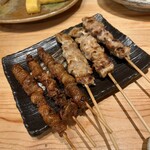
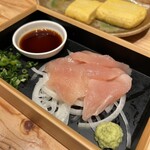
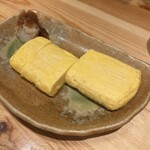
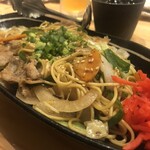
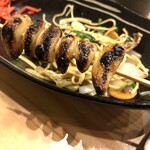
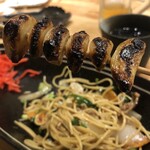
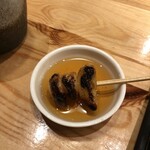
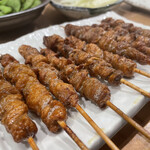
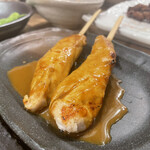
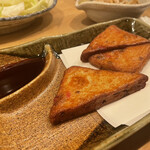
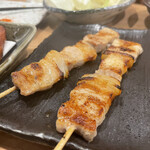
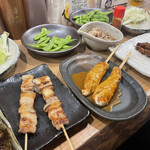
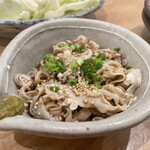
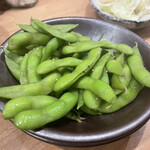
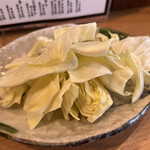
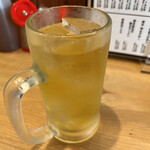
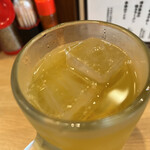
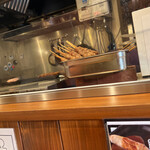
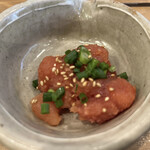
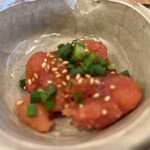
Details
Reservation Info
can be reserved
Children
child-friendly
Payment Method
Credit cards accepted
(VISA, Master, JCB, AMEX, Diners)
Electronic money is not accepted
QR code payment accepted
(QR code payment is accepted (PayPay)
Restaurant Service Fee
Appetizer: 300 yen
This fee is charged by the restaurant, not related to our platform
Number of Seats
62 seats
(2nd floor: private parties on request)
Private Dining Rooms
None
Smoking and Non-Smoking
All seats are non-smoking Due to the enforcement of the Law Concerning Measures Against Passive Smoking (Revised Health Promotion Law) from April 1, 2020, all seats are non-smoking.
Parking
None
Facilities
Counter seats available
Drink
Sake available, shochu available, wine available
Comments
(20)
zucca178504
3.10
I've been going to this restaurant for about 2 years now, but it's not good haha. Well, it's not bad, but it's not good either. It gives off a vibe of being run by student part-timers, and I can't get into it. They talk about random and uninteresting things loudly, and it's just not my thing to join in on that. It feels like a cheap, low-quality place. The food is average at best. If you've had similar experiences, you know what I mean. One thing that was good was the taste of one dish, but everything else was just average.




ca000028
4.00
Kawaya in Hakata. I visited this place because my friend brought me here before and said it was delicious! We ordered 10 pieces of their famous "torikawa" (grilled chicken skin). The surface was crispy from being carefully grilled with sauce, while the inside was moist and delicious! Perfect with beer! Next, we tried the specialty "shigi yaki" (grilled chicken skewers) with wasabi soy sauce. The wasabi was strong, so be careful if you're not a fan. We also ordered seseri (chicken neck), nankotsu (cartilage), hatsu (chicken heart), pork belly, and ponjiri (chicken tail). They were all juicy and perfectly grilled, so tasty! The vegetables included crispy bell peppers with miso and mayonnaise, which was a great combination. Personally, I loved the pork belly the most! Everything was delicious and satisfying! I will definitely be coming back! The restaurant is right in front of JR Kyobashi Station, with the Tozai Line platform right in front of it!
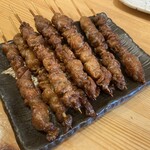
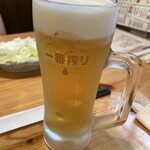
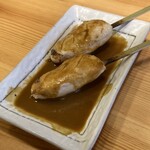
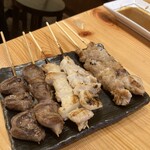
mirusei
3.40
After work, I stopped by the station around 9:30 pm. The first floor was half full with customers. I sat at the counter near the entrance and ordered green tea, chicken liver, pork belly, chicken skin, tsukune with salt, tsukune with sauce, salted chicken meat, chicken meat with sauce, and two garlic skewers. The green tea was okay. They recommended eating the cabbage appetizer with vinegar or salt, so I tried both and it was not bad. The tsukune with salt was delicious, and the tsukune with sauce was tasty. The garlic skewers were alright, the pork belly was delicious, the chicken liver was a bit too spicy with wasabi, the chicken skin was average, and the chicken meat with onion was not great. I paid 2651 yen with my card and left.

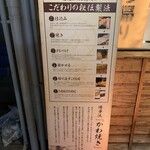
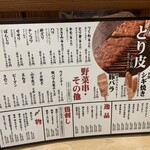
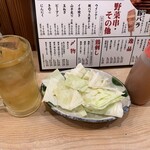
うさこまんじゅう
4.00
I was intrigued by a yakitori restaurant that specializes in chicken skin yakitori, so I decided to visit. Thanks to its amazing location just 5 seconds from the south exit of JR Kyobashi Station, the first floor was almost full by 6:30pm. I was seated on the second floor, which also quickly filled up within 10 minutes. Despite not having a reservation, I was impressed by how they managed to accommodate us. The dishes I ordered included: skewers of chicken skin, tsukune (chicken meatballs), heart, pork belly, pork belly with shiso and cheese, and chicken tenderloin; sashimi of sandfish; side dishes of sesame mackerel and rolled omelette with dashi broth; and Sapporo Red Star beer. Although the dishes arrived a bit slowly due to the crowdedness, they were incredibly delicious. It was a satisfying experience to encounter such tasty yakitori after a long time. I can always trust a restaurant that serves Sapporo Red Star beer. I definitely want to go back again.
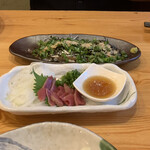
まっきー58020
2.50
At first, we were seated on the second floor, but it was too noisy due to a party, so we asked to move to the first floor. The sweet potato tempura was the most delicious. The tsukune was okay. Also, the sasami with wasabi soy sauce was light and refreshing. Thank you for the meal.
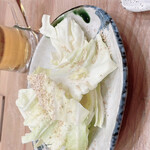
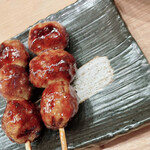
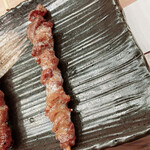
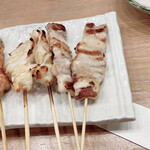
cheiron@
2.00
When I traveled to Hakata, I tried chicken skin for the first time and loved it. I couldn't find it easily in Osaka, so I searched for a restaurant. I was able to make a reservation easily and the service was friendly. The restaurant was crowded when I arrived, so I was glad I had made a reservation. I was looking forward to trying the sesame mackerel, but it was bland. The yakitori was average, but the chicken heart had a slightly unpleasant smell which dampened my excitement. Finally, I tried the chicken skin...and it didn't bring back the same excitement I had in Hakata. The restaurant was chaotic and crowded, so I don't think I'll be coming back.
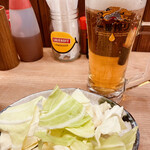
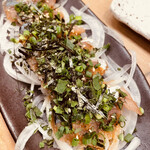
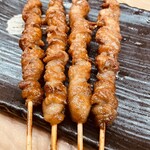
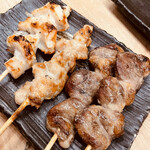
NS417
2.50
Two years ago, I visited a franchise restaurant in Hakata. I knew beforehand that it had a central kitchen and the taste would be different from the original store. While the prices were not high, the quality felt like a 50% inferior version compared to the main store, making it somewhat expensive. However, as just a yakitori izakaya, it wasn't bad. I didn't drink beer because they only had Kirin (the main store serves Asahi). The soft drinks were cheap and came in large quantities. I ordered jasmine tea, oolong tea, Hakata mentaiko kawa-yaki, 5 pieces of shigi-yaki yakitori, a mixed plate of 5 yakitori, sesame grilled mackerel, grilled chicken meatballs, pork belly, and Hakata-style grilled ramen from the food menu.




アキノスキナキヒト
3.50
In the past, I visited a affiliated restaurant in Fukuoka and had a delicious meal, so I decided to visit the Osaka branch. The food was very tasty, but I felt that there was something different compared to the restaurant in Fukuoka. The dishes were overall delicious, but I felt that the ones I had in Fukuoka were even better. I couldn't help but wonder if there is a difference between eating at the actual location and eating at a different branch.
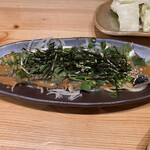
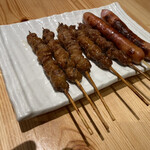
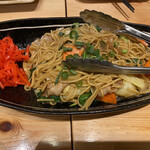
幅ちゃん2号
3.10
I used to go to Hakata for business once a year, but due to the impact of Corona, it has completely disappeared. One of the things I wanted to eat next time I went was the crispy grilled "kawa-yaki." I received information that you can also eat it in Kyobashi! So I came to this place near the south exit of JR Kyobashi Station. "Hakata Kawaya Kyobashi Minami Exit Store" is located right in front of JR Kyobashi Station South Exit. I sat at the counter and started with a draft beer cheers~! Then, I ordered the "kawa-yaki" that I wanted to eat. What I ate was... - Special "kawa-yaki" ... 187 yen (tax included) x 5 Only the neck area of the kawa is used, with a crispy and fragrant exterior and a soft and chewy interior. You can taste the exquisite sauce that has permeated the entire skewer. The secret manufacturing method that takes 6 days until completion can only be tasted at "Hakata Kawaya." But it wasn't as crispy as I expected. Well, it's delicious though. I expected too much! How about the authentic Hakata version? - Special "shigi-yaki" ... 198 yen (tax included) x 2 Grilled chicken tenderloin with wasabi soy sauce, a slightly adult version of yakitori. This goes well with alcohol, it's my preferred taste. The others were... - Tsukune ... 176 yen (tax included) x 2 - Hatsu (chicken heart) ... 176 yen (tax included) x 2 - Tama konnyaku dengaku skewer ... 176 yen (tax included) x 1 "Hakata Kawaya Kyobashi Minami Exit Store" I don't know if I expected too much or if it's slightly different from the authentic version. But I felt a little disappointed. However, it was delicious to have yakitori after a long time!! Thank you very much for the meal~!
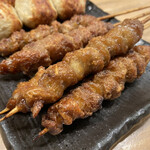
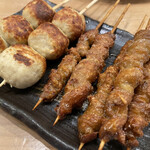
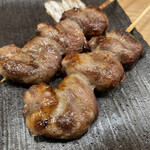
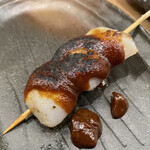
トンボ1024
3.80
Tonight, I had drinks here♪ It's been a while since I had chicken skin, so I came with my colleagues after rejecting their suggestion of a sit-down restaurant and opting for a standing bar instead. We arrived early as the place closes at 9 pm. This place is called "Kawaya" and is based in Fukuoka, Kyushu, right? I read some reviews, and it seems to be popular. But enough of the chit-chat, let's enjoy the chicken skin after a long time! I quickly ordered 20 pieces of skin and sat down, with chicken skin on my mind. I couldn't hear my colleagues talking. The chicken skin arrived! It was delicious! Despite its light seasoning, the flavor was perfect and not overwhelming. It was crispy on the outside and slightly tender on the inside. I devoured it while it was still warm. I also had a large whiskey highball, and before I knew it, I had eaten my colleagues' chicken skin too. It was a satisfying meal. I will definitely visit again. Thank you for the delicious meal♪
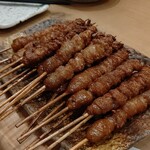
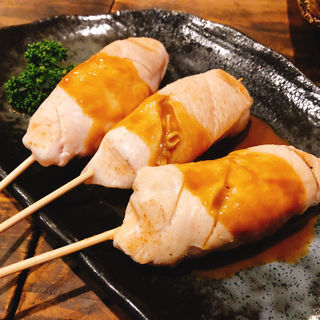
ChnnSiTaKi RiNa
4.60
Delicious❗️ Grilled chicken skin, a staple at Hakata yakitori restaurants❗️ Pork belly skewers, a must-try❗️ Hakata-style pork bone ramen❗️ And of course, the mentaiko potato salad❗️ In November 2020, the Nagahama pork bone ramen and pork belly skewers are classic dishes from Hakata street stalls❗️ You can easily eat 10 pieces of the grilled chicken skin from Kawaya❗️ The grilled ramen is the Nagahama pork bone version❗️ A light pork bone ramen is good❗️ If you want the real rich Hakata pork bone flavor, go for the sauce-drenched version❗️ It's pitch black❗️(laughs) It's a nostalgic taste that you can't stop eating❗️ Grilled chicken skin, beer, pickled cabbage, and then the mega highball❗️ What a feast‼️ Thank you for the meal~(^-^)/
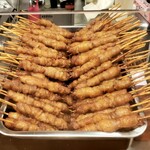
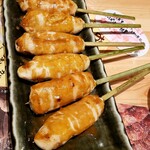
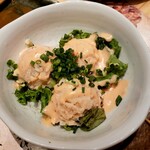
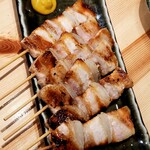
pe_chan24
3.70
Third stop in Kyobashi was the long-awaited favorite place, Kawaya (ᵒ̴̷͈ᗨᵒ̴̶̷͈ )✧ It's nice that it's from Hakata, and the boss highly recommended it, so I was very interested. Ma~san was like, "There are so many Kawaya in Nagoya, why go there?" with a reluctant expression, but we ended up going anyway! The boss was in a good mood^ ^^ ^ The handsome prince also joined us, and the five of us had a toast. I love this place! I can drink as many sours as I want here. The crispy chicken skin was delicious and the chicken breast was also tasty. There was no pressure to order a variety of dishes, which was nice. It felt like a chain restaurant, but if it were in my local area, I would definitely visit often. It's convenient, affordable, and delicious. Please open a branch in Tokushima! I would love to visit Kawaya again. The Mega Highball and super fizzy sours were great ❤️

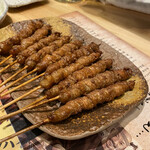
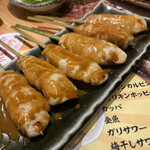
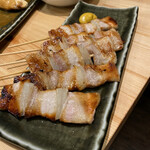
mukoh91
3.10
The location is right in front of the Kyobashi Minami ticket gate! I was surprised to see young staff members at the counter and tables in the restaurant. Both the grill and the dining area were being managed by young people in their 20s. The grilled dumplings had a crispy skin and were delicious. The menu had a wide variety of options, which was great.
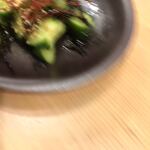
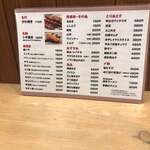
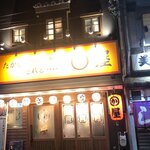
す〜さん!
3.00
I was curious about the Hakata Torikawa restaurant. Visited on Tuesday, December 10, 2019. I was craving the Torikawa I had last time in Hakata. Hakata Torikawa was delicious. It seems like it could become addictive. However, overall it was a bit pricey, especially the individual alcohol items. I wish they could be a bit cheaper. It was a bit surprising to spend 12,000 yen for two people. Well, we enjoyed the meal, and it would be good to opt for all-you-can-drink alcohol next time! Thank you for the meal.
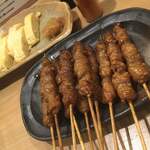
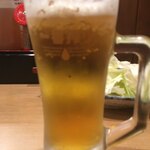
*花より団子*
3.10
Usually, I'm actually not a fan of skin, but the skin here, just like in Hakata, was delicious. Honestly, I used to think that skin was cheap and not very good, but I learned that it can be delicious if you take the time to prepare it properly. It's worth it to put in the effort because everything tastes better when you do. This place also offers other dishes from Hakata, so I highly recommend it.
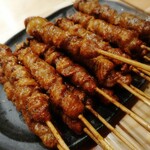
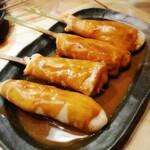
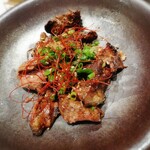
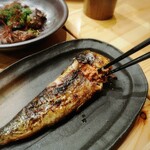
rasys39
3.90
Long-awaited Kawaya! I've always wanted to go in Fukuoka, but couldn't make a reservation. The chicken skin Fukuoka style! There are really only a few places in Osaka with this style of chicken skin, and I've tried it in Fukuoka and Osaka, but I still want to try Kawaya. I found out that Kawaya opened in Osaka! It's really delicious! It's crispy, not too fatty, and still juicy. The sauce is also well-infused, which I love. There's also a specialty dish called Shigi-yaki! I had heard of it before, but didn't know much about it. However, the balance of wasabi soy sauce and chicken tenderloin was delicious and exceeded my expectations! The other dishes like chicken wings, bonjiri, nankotsu, seseri, pork belly, fried chicken, and sesame mackerel were all delicious too! The best! I want to go again. Thank you for the meal.
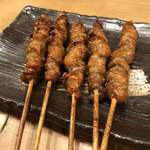
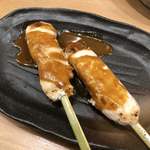
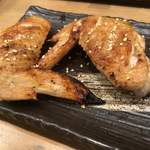
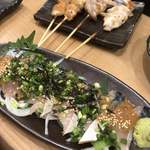
T-SIRLOIN
1.00
The thin and light taste of the dishes at "Chuka Ryori Miwatei" was seriously delicious. After that, I took the JR Loop Line to Kyobashi. The restaurant I headed to was "Hakata Kawaya Kyobashi Minamiguchi-ten," recommended by my companion for the day, "Ougi no Kaname." Ougi no Kaname is from Kumamoto, Kyushu, and he mentioned, "In Kyushu, there is a specialty called 'torikawa,' particularly popular in Hakata. Torikawa is a unique dish where the chicken skin is grilled and rested, then grilled again over a week to develop a distinct flavor. It's a prideful dish that impresses food enthusiasts in Kyushu. There's a new restaurant in Kyobashi that serves this torikawa. Would you like to try it?" So, I decided to visit for the first time. The main goal of this day's food tour was to "eat torikawa." With high expectations, we entered the restaurant, which had quite a few customers. We sat at the counter in the center and placed our order. We ordered 10 pieces of torikawa to start. We decided to toast with "Ukon no Chikara." Cheers! We continued to toast with draft beer. Cheers! When I took a bite of the torikawa, I was surprised by the lack of any flavor. It was really thin and light in taste. Before eating, I expected it to have more punch. I was taken aback by the lack of flavor the moment I ate it. It was really disappointing. Kyushu cuisine is known for its bold and rich flavors. In actuality, Kyushu soy sauce is characterized by its rich sweetness. Kyushu soy sauce is sweet and rich, which gives the dishes a punchy flavor. Ougi no Kaname, being from Kyushu, expressed his disappointment, saying, "Kyushu cuisine is known for its sweet and savory flavors. Most of it is due to the unique sweet soy sauce used in Kyushu. I suspect this restaurant is using cheap soy sauce from a nearby wholesale store or a 100-yen shop. This taste clearly does not use Kyushu soy sauce. Kyushu men have a pride as Kyushu men. While we say Kyushu men, there are no expressions like Shikoku men or Kansai men. That's how much pride Kyushu men have as Kyushu men. From the perspective of Kyushu men, it's unacceptable to serve such Kyushu cuisine. They are clearly underestimating Kyushu. This is absolutely unforgivable." As we ate, I started to notice a slight unpleasant smell as well. Despite the extensive preparation over a week, there was a noticeable odor. Ougi no Kaname then said, "Wait a minute," and started fiddling with his phone. He showed us, "In Hakata, authentic torikawa costs 100-110 yen per piece. This place is charging 170 yen per piece. They're joking around." So, I suggested, "Let's try ordering something else," and we added pork belly and bonjiri to our order. When I tried the additional pork belly and bonjiri, they were just as lacking in saltiness as the torikawa. They were incredibly light in flavor. I've tried various yakitori dishes before, but this was the first time I encountered such a lack of saltiness in a salt-grilled dish. At this point, it became a question of the skill of the grill chef or if there was a mistake in the restaurant's grilling manual. Either way, something was clearly wrong somewhere. Otherwise, there's no way they would serve a salt-grilled yakitori with absolutely no saltiness. I had no choice but to sprinkle table salt on them. The table salt was pure sodium chloride. As I sprinkled it, I commented, "What's this? They should use rock salt instead."
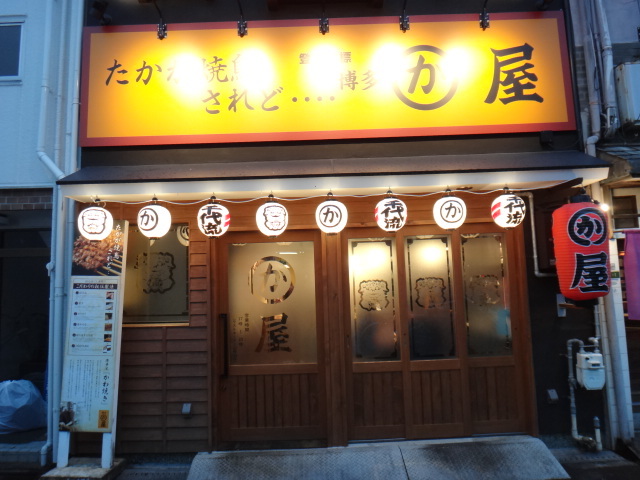
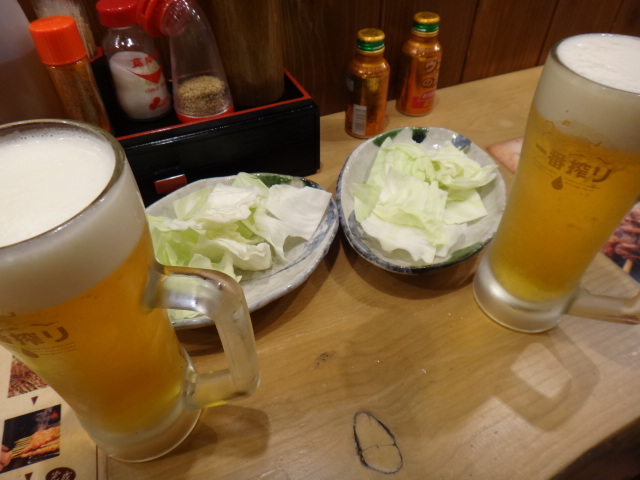
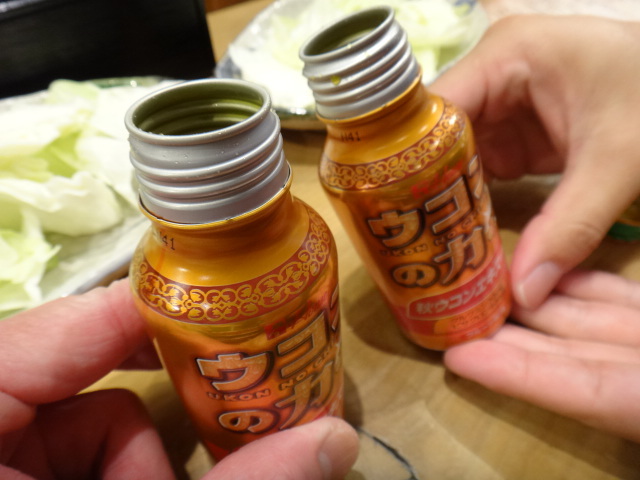
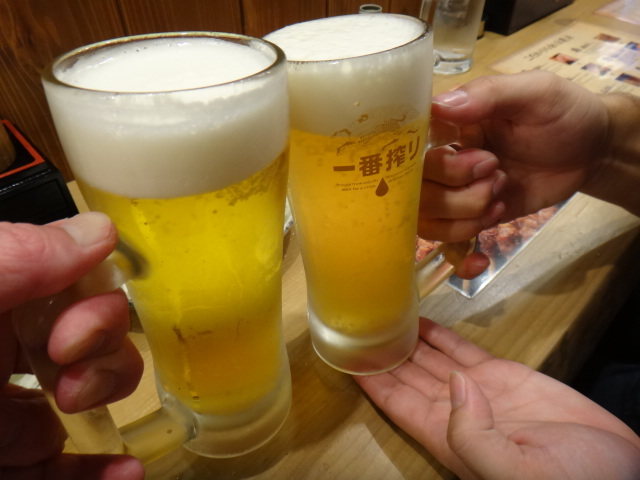
ぷたむし
3.00
Recently, I visited a new restaurant that I had been wanting to try. It was quite popular, so I had trouble getting a reservation. I finally got a table on a late Saturday night, and the place was almost full.
- Sesame Mackerel: Although it can't beat the authentic taste in Hakata, the tender mackerel with a rich sesame sauce was delicious.
- Grilled Sardine with Mentaiko: This was my first time trying it, and the combination of sardine and spicy cod roe was surprisingly good. The sardine was fatty and tasty.
- Grilled Chicken Skewers: The grilled chicken skin had a slight gamey flavor, but the texture was slightly chewy compared to regular chicken skin, which was interesting. The taste was good. The bonjiri (tail) was quite fatty, perfect for when you're really hungry, but it might be a bit too rich. The thigh meat, on the other hand, was less fatty and slightly dry.
- Grilled Beef Tongue: Surprisingly, the best dish was the grilled beef tongue. It was slightly salty but had a nice chewy texture that was delicious.
- Chicken Skin Dumplings: The chicken skin dumplings were juicy and delicious, unlike the usual tough ones. The filling was perfectly tasty.
- Grilled Ramen: It was like a ramen version of salt yakisoba. It was good and came out quickly after ordering, making it great for a quick meal. However, I felt it was a bit pricey for the taste.
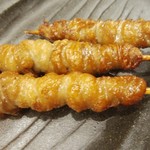
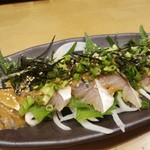
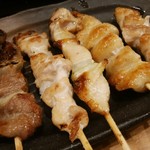
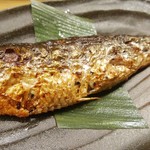
s_muc
3.40
Three of us visited this restaurant for the first time. I had heard that their specialty is the skin dishes, but I wasn't a big fan of skin. However, when I tried it, it was surprisingly delicious! The sesame mackerel was amazing, I love mackerel so this was a hit for me. The dish with soft bone-like pieces mixed with plum was interesting. It smelled a bit funky at first, but it grew on me as I ate it. I forgot the name though. My friend ordered something with sasami, but it didn't seem that great. When I asked if they had soup, they said it comes at the end, and I got one in advance. It had a strong kelp flavor. Overall, the prices were not cheap, but the food was unique and tasty!
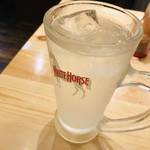
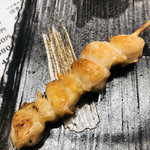
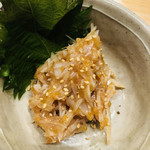
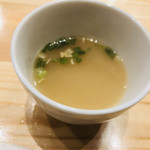
wakeu215
2.00
For now, it doesn't match the price. Chicken skin is 170 yen per piece. Even if it took time to prepare, the chicken skin is too expensive. Also, the taste just seems like regular soy sauce flavor. Considering the overall cost performance, it's tough. Especially in Osaka, and in Kyobashi. It's a shame that the restaurant didn't have any distinctive features.
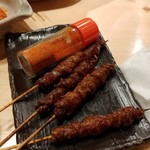
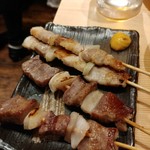
Email Login